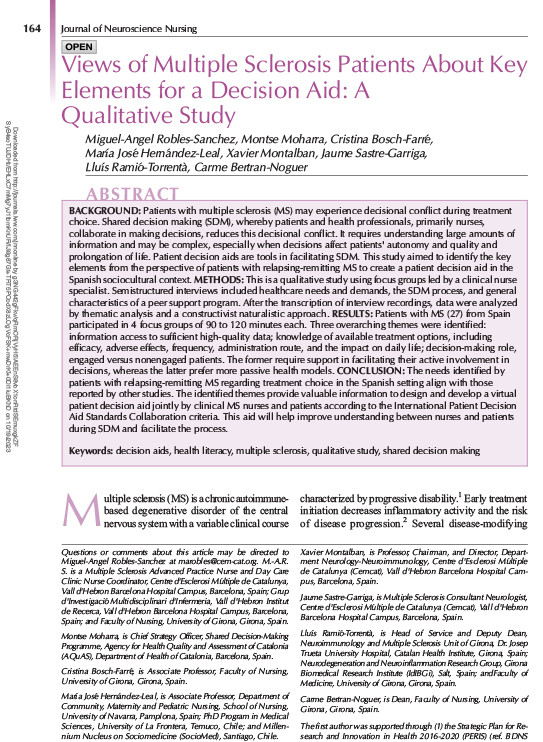Views of Multiple Sclerosis Patients About Key Elements for a Decision Aid: A Qualitative Study
Oct 23
Abstract
BACKGROUND: Patients with multiple sclerosis (MS) may experience decisional conflict during treatment choice. Shared decision making (SDM), whereby patients and health professionals, primarily nurses, collaborate in making decisions, reduces this decisional conflict. It requires understanding large amounts of information and may be complex, especially when decisions affect patients' autonomy and quality and prolongation of life. Patient decision aids are tools in facilitating SDM. This study aimed to identify the key elements from the perspective of patients with relapsing-remitting MS to create a patient decision aid in the Spanish sociocultural context. METHODS: This is a qualitative study using focus groups led by a clinical nurse specialist. Semistructured interviews included healthcare needs and demands, the SDM process, and general characteristics of a peer support program. After the transcription of interview recordings, data were analyzed by thematic analysis and a constructivist naturalistic approach. RESULTS: Patients with MS (27) from Spain participated in 4 focus groups of 90 to 120 minutes each. Three overarching themes were identified: information access to sufficient high-quality data; knowledge of available treatment options, including efficacy, adverse effects, frequency, administration route, and the impact on daily life; decision-making role, engaged versus nonengaged patients. The former require support in facilitating their active involvement in decisions, whereas the latter prefer more passive health models. CONCLUSION: The needs identified by patients with relapsing-remitting MS regarding treatment choice in the Spanish setting align with those reported by other studies. The identified themes provide valuable information to design and develop a virtual patient decision aid jointly by clinical MS nurses and patients according to the International Patient Decision Aid Standards Collaboration criteria. This aid will help improve understanding between nurses and patients during SDM and facilitate the process.

